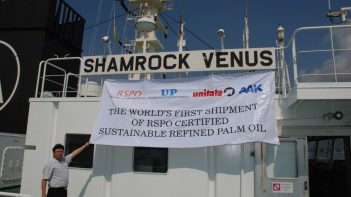RSPO responds to comments by Ségolène Royal, French Minister of Ecology, Sustainable Development and Energy, during her intervention on Le Petit Journal (Canal+)
London, 17 June 2015 – The Roundtable on Sustainable Palm Oil, the leading global organisation promoting the sustainable production of palm oil, is deeply concerned that comments by Ségolène Royal, French Minister of Ecology, Sustainable Development and Energy, could harm rather than help efforts to curb global deforestation.
The answer to global deforestation challenges is to source Certified Sustainable Palm Oil (CSPO), instead of conventional palm oil.
Compared to other oil crops such as soy bean, sunflower or rapeseed, oil palms produce significantly more vegetable oil per hectare of land (4-10 times more). Switching to other vegetable oils may very well result in more forests being converted into agricultural land, not less.
Global demand for vegetable oils continues to increase, growing by over 5 percent a year for more than a decade, and is expected to continue to grow at that rate for the next decade. This growth rate substantially exceeds the United Nations estimate for global population growth of 1.1 percent through 2020.
Oil palm contributes significantly to the global supply of edible oils. In 2013, palm oil and palm kernel oil accounted for 40% of the 169 million tonnes of global vegetable and fruit oils produced. In order to meet this global demand, CSPO must be part of any solution. Using less efficient crops might have severe consequences for the environment.
Halting the use of palm oil in Europe will not solve the worst problems. Many other countries such as China and India will continue using palm oil, with consumption predicted to increase as the middle classes in these countries grow. Developing countries will continue to increase production for growing Indian and Chinese markets, and with diminished pressure for sustainable practice.
Without pressure for sustainable palm oil from developed nations, the likely outcome is more unsustainable palm oil. For this reason, the RSPO calls on all European industries and stakeholders to move towards 100% CSPO by 2020.
Given its scale and ability to influence global markets, a 100% CSPO Europe would encourage more growers to move to more sustainable production practices, while helping make CSPO more attractive and available to other large markets.
RSPO recognises that palm oil’s cultivation is one of the major causes of deforestation in South-East Asia. RSPO was created in 2004 to address this issue and currently 20% of the world’s palm oil production is RSPO certified. RSPO also acknowledges that more needs to be done to improve the credibility of its certification. To this end, the RSPO Board of Governors has recently announced its intention to adopt a set of additional voluntary criteria, aimed at further enhancing the existing certification requirements on peat, deforestation and indigenous people’s rights.
Among our members, Ferrero is one of the leading food manufacturers promoting the use of CSPO. As of 1st January 2015, Ferrero products contain only 100% segregated CSPO. For a large food manufacturer this is a considerable achievement. We encourage other companies to mirror Ferrero’s commitment to sustainable palm oil sourcing.
(END)
About RSPO
In response to the urgent and pressing global call for sustainably-produced palm oil, the Roundtable on Sustainable Palm Oil (RSPO) was formed in 2004 with the objective of promoting the growth and use of sustainable oil palm products through credible global standards and engagement of stakeholders. The seat of the association is in Zurich, Switzerland, while the secretariat is currently based in Kuala Lumpur with satellite offices in Jakarta, London and Zoetermeer (NL).
RSPO is a not-for-profit association that unites stakeholders from seven sectors of the palm oil industry - oil palm producers, palm oil processors or traders, consumer goods manufacturers, retailers, banks and investors, environmental or nature conservation NGOs and social or developmental NGOs – to develop and implement global standards for sustainable palm oil.
Such multi-stakeholder representation is mirrored in the governance structure of RSPO such that seats in the Executive Board and project-level Working Groups are fairly allocated to each sector. In this way, RSPO lives out the philosophy of the "roundtable" by giving equal rights to each stakeholder group to bring group-specific agendas to the roundtable, facilitating traditionally adversarial stakeholders and business competitors to work together towards a common objective and make decisions by consensus.
|
CONTACTS FOR RSPO SECRETARIAT: |
|
|---|---|
|
Danielle Morley |
Giovanni Colombo
|
Keep reading
Call for Proposal: Study on Wild Palms in West and Central Africa

RSPO hosts first Africa downstream sustainable palm oil supply chain forum in Cape Town

Nearly two decades on, Europe continues to drive global demand for RSPO Certified Palm Oil

Communicating Sustainable Palm Oil - examples of success across Europe
[EOT] Terms of Reference: Independent Smallholders Outreach Programme in Indonesia

RT2023 Delegates Propose Solutions to Reinforce RSPO’s Assurance System – End-Year Highlights of Assurance Standing Committee
RSPO UK Members' Day Examines Shifting Dynamics of Doing Business within Europe

Celebrating 20 Years of RSPO’s Sustainability Journey




